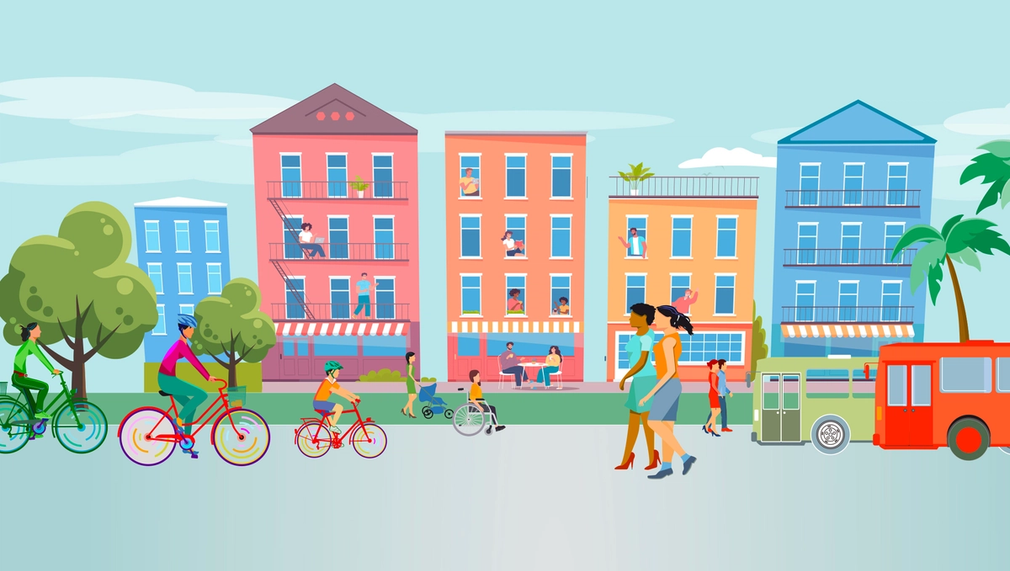Mobility & Affordable Housing for Transportation Equity
Move LA led the successful broad-based coalition efforts to pass transformative mobility solutions through Measures R (2008) and M (2016) in LA County. Our bold vision is for a more accessible, equitable, and climate-resilient region with clean air, multi-modal mobility, affordable housing, good jobs, and community development without displacement. Our initiative will fight for equitable investments in affordable housing, better public transit service, and biking, walking, and bus infrastructure that reduces single-passenger vehicle travel.

Please list the organizations collaborating on this proposal.
SLATE-Z (South Los Angeles Transit Empowerment Zone)
What is the primary issue area that your application will impact?
Public Transit
In which areas of Los Angeles will you be directly working?
South LA
County of Los Angeles
In what stage of innovation is this project, program, or initiative?
Expand existing project, program, or initiative
What is your understanding of the issue that you are seeking to address?
The COVID-19 pandemic has exposed systemic problems in Los Angeles County, including decades of underinvestment in affordable housing, public transportation, and other infrastructure needed to build a more just and equitable society. Historic wildfires, the country's worst air quality, and the fact that 50% of climate emissions in California come from transportation put into stark relief the need to address our auto-dependence. And yet, our transit system can be slow, unreliable, unaffordable, and unsafe, especially for those who use it the most. For instance, 90% of LA Metro's riders earn less than $30k/year, and while the average Angelenos can access 2.8 million jobs in 45 minutes by car, African American Angelenos using transit can only access about 150,000 jobs within the same timeframe. We must address these inequities with multimodal transportation options near affordable housing to equitably and sustainably address climate change and air quality challenges in LA County.
Describe the project, program, or initiative this grant will support to address the issue.
This program will equitably and sustainably address mobility, affordable housing, climate change, and air quality by: 1) Relentlessly Rebuilding Transit Ridership and Expanding LA County's Transit Infrastructure with More Mobility Options - Identify ways to scale the Los Angeles Department of Transportation Universal Basic Mobility pilot in South LA countywide and statewide - Find sustainable funding for Metro's Fareless System Initiative (FSI)--a pilot program Move LA helped develop that provides free transit for 1.3 million K-12 and community college students in LA County--and scale it for student access statewide - Support good pay for LA Metro transit operators and transit ambassadors who run transit and keep riders safe - Champion key projects including Bus Rapid Transit, pedestrian and bicycle transit, bus prioritization, and rail infrastructure that advance federal Justice40 principles, resulting in equitable transportation that benefits transit riders (predominantly low-income, and/or Black, Indigenous, People of Color) 2) Champion Boulevards of Equity and Opportunity with Robust Affordable Housing and Transit Services - Tie transit investments described above with mixed-income, mixed-use, moderate to higher density affordable housing along commercial corridors - Fund and provide shade along these corridors, especially street trees and shelters - Fund tenant protections to prevent displacement - Create workforce development opportunities for high-road jobs
Describe how Los Angeles County will be different if your work is successful.
If we are successful: - LA County residents could benefit from the 'Universal Basic Mobility' pilot, providing free and subsidized multi-modal transportation options; - K-12 and community college students will benefit from fare-free travel throughout LA County and California, reducing climate change emissions and traffic; - Bus riders will benefit from a) faster bus service in at least two corridors with bus-only lanes, b) service restored to pre-pandemic levels with more frequent and reliable service, and c) a quarter-mile walk or less to a bus stop for 99% of current riders, and d) shade from extreme heat; - Transit riders will be able to finally take Metro to LAX, or ride from Boyle Heights to Santa Monica beach on one train; - South LA residents will celebrate the groundbreaking of the Rail to Rail Project, the first Metro line dedicated to walking and biking; and - Low-income residents in the City of LA will have access to affordable housing, tenant protections, and good jobs.
What evidence do you have that this project, program, or initiative is or will be successful, and how will you define and measure success?
1. We are measuring impacts in partnership with the TransitCenter through their Equity Dashboard which tracks data on transit equity and access: https://dashboard.transitcenter.org/. Better infrastructure for buses, cycling, walking, and rail should shorten travel times and provide reliable service for riders, helping to address the significant racial access gaps to reach job opportunities. The impact can be measured by several factors but the most important is their ability to reach their destination in a timely manner. 2. Restoring Metro bus service to pre-pandemic levels, the Universal Basic Mobility pilot, and the fare-free student pass pilot program will have measurable results on ridership. For instance, student ridership has increased dramatically since the pilot launched last year. 3. State and local governments and nonprofits track housing production, homelessness prevention, and tenant protections, which should all measurably increase if our initiative is successful.
Approximately how many people will be impacted by this project, program, or initiative?
Direct Impact: 400
Indirect Impact: 1,000,000